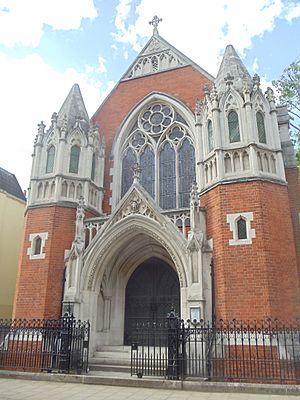Deutsche Evangelische Christuskirche facts for kids
Quick facts for kids Deutsche Evangelische Christuskirche (German Christ Church) |
|
|---|---|
 |
|
| Location | Montpelier Place, Knightsbridge, London |
| Country | UK |
| Denomination | German Protestant Church |
| Tradition | Augsburger Confession |
| Website | http://www.ev-kirche-london-west.org.uk |
| History | |
| Founder(s) | Baron Sir John Henry William Schröder |
| Dedicated | 27 November 1904 |
| Architecture | |
| Architect(s) | Edward Boehmer Charles G. F. Rees |
| Completed | 27 November 1904 |
| Administration | |
| Synod | Synod of German-Speaking Lutheran, Reformed and United Congregations in Great Britain |
The Deutsche Evangelische Christuskirche, also known as the German Christ Church, is a special church located in Knightsbridge, London. It's on Montpelier Place. A German theologian named Julius Rieger once said it was the most important German church in London. This church has a rich history and serves as a gathering place for German-speaking people in the city.
Contents
History of the German Christ Church
Early Beginnings of the Congregation
The story of this church began with a group of German worshippers. They were part of a congregation called the German Chapel Royal. This group used to meet in places like the Savoy Chapel and St James's Palace in Westminster.
Before that, another German Lutheran group met at Holy Trinity the Less until the 1860s. Later, they gathered at the Hamburg Lutheran Church. This church was next to the German Hospital in Dalston.
Finding a New Home
Around 1901, the official support for German services at the Chapel Royal ended. So, the congregation needed a new place to worship. They moved to the Eccleston Hall in Victoria for a while.
Building a Dedicated Church
A kind person named Sir John Schroder, 1st Baronet decided to fund a new church building. He did this to honor his late wife, Evelina. This generous gift made the new church possible.
To make sure the church building would be cared for, a special agreement was made. This agreement, called a Deed of Trust, was set up on December 20, 1904. It helped ensure the church would be maintained for many years.
Design and Construction
The church building was designed by two architects: Edward Boehmer and Charles G. F. Rees. The construction work was carried out by a company called Dove Brothers. They built the church between 1904 and 1905.
The beautiful stained glass windows in the church were created by several artists. These included Franz Xaver Zettler, Ostermann & Hartwein, and Schneiders & Schmolz.
Opening Day
The church was officially opened on November 27, 1904. Many important people attended the dedication ceremony. These guests included Count Johann Heinrich von Bernstorff, Prince Christian of Schleswig-Holstein, and Princess Marie Louise of Schleswig-Holstein. Also present were Prince Louis of Battenberg and Princess Victoria of Hesse and by Rhine.
A Place of Refuge
In May 1946, a German Christian theologian named Julius Rieger wrote a report about the church. He stated that it was the most important German church in London. He also noted that many of its members were people who had sought safety from Nazi Germany.
The Church Today
How the Church is Organized
In 2012, the way the church was managed changed. The responsibility for the building and for running the church's activities was separated. This means two different groups now take care of things.
- THE CONGREGATION AT GERMAN CHRIST CHURCH LONDON: This group is a registered charity (No. 1149991). It focuses on the church members and their activities.
- THE GERMAN CHRIST CHURCH LONDON CHARITY: This group is also a registered charity (No. 251120). It is responsible for maintaining the church building itself.
Part of a Wider Network
The congregation of the German Christ Church is part of a larger group. This group is called the "Synod of German-Speaking Lutheran, Reformed and United Congregations in Great Britain."
Besides the Christuskirche in London, this network includes other German-speaking congregations. You can find these congregations in places like Oxford, Petersham, Farnborough, and Reading.
 | Madam C. J. Walker |
 | Janet Emerson Bashen |
 | Annie Turnbo Malone |
 | Maggie L. Walker |

